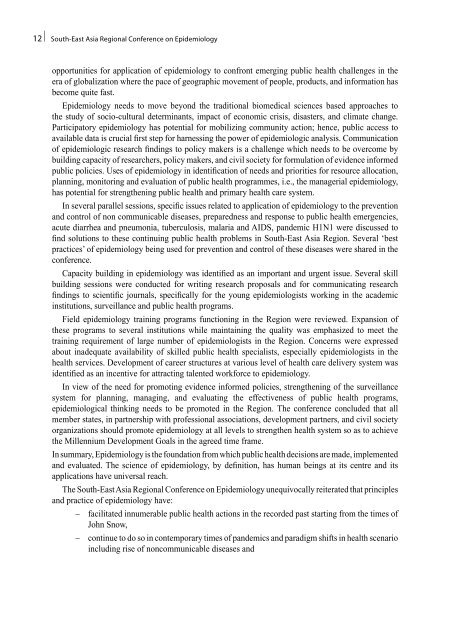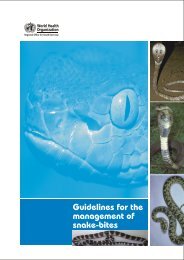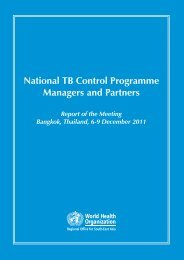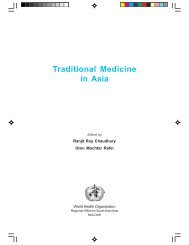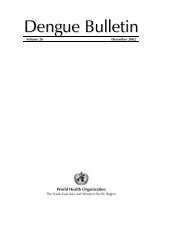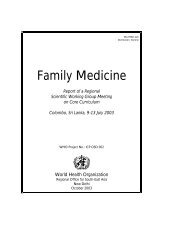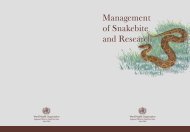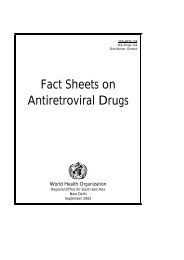South-East Asia Regional Conference on Epidemiology
South-East Asia Regional Conference on Epidemiology
South-East Asia Regional Conference on Epidemiology
Create successful ePaper yourself
Turn your PDF publications into a flip-book with our unique Google optimized e-Paper software.
12 | <str<strong>on</strong>g>South</str<strong>on</strong>g>-<str<strong>on</strong>g>East</str<strong>on</strong>g> <str<strong>on</strong>g>Asia</str<strong>on</strong>g> <str<strong>on</strong>g>Regi<strong>on</strong>al</str<strong>on</strong>g> <str<strong>on</strong>g>C<strong>on</strong>ference</str<strong>on</strong>g> <strong>on</strong> <strong>Epidemiology</strong><br />
opportunities for applicati<strong>on</strong> of epidemiology to c<strong>on</strong>fr<strong>on</strong>t emerging public health challenges in the<br />
era of globalizati<strong>on</strong> where the pace of geographic movement of people, products, and informati<strong>on</strong> has<br />
become quite fast.<br />
<strong>Epidemiology</strong> needs to move bey<strong>on</strong>d the traditi<strong>on</strong>al biomedical sciences based approaches to<br />
the study of socio-cultural determinants, impact of ec<strong>on</strong>omic crisis, disasters, and climate change.<br />
Participatory epidemiology has potential for mobilizing community acti<strong>on</strong>; hence, public access to<br />
available data is crucial first step for harnessing the power of epidemiologic analysis. Communicati<strong>on</strong><br />
of epidemiologic research findings to policy makers is a challenge which needs to be overcome by<br />
building capacity of researchers, policy makers, and civil society for formulati<strong>on</strong> of evidence informed<br />
public policies. Uses of epidemiology in identificati<strong>on</strong> of needs and priorities for resource allocati<strong>on</strong>,<br />
planning, m<strong>on</strong>itoring and evaluati<strong>on</strong> of public health programmes, i.e., the managerial epidemiology,<br />
has potential for strengthening public health and primary health care system.<br />
In several parallel sessi<strong>on</strong>s, specific issues related to applicati<strong>on</strong> of epidemiology to the preventi<strong>on</strong><br />
and c<strong>on</strong>trol of n<strong>on</strong> communicable diseases, preparedness and resp<strong>on</strong>se to public health emergencies,<br />
acute diarrhea and pneum<strong>on</strong>ia, tuberculosis, malaria and AIDS, pandemic H1N1 were discussed to<br />
find soluti<strong>on</strong>s to these c<strong>on</strong>tinuing public health problems in <str<strong>on</strong>g>South</str<strong>on</strong>g>-<str<strong>on</strong>g>East</str<strong>on</strong>g> <str<strong>on</strong>g>Asia</str<strong>on</strong>g> Regi<strong>on</strong>. Several ‘best<br />
practices’ of epidemiology being used for preventi<strong>on</strong> and c<strong>on</strong>trol of these diseases were shared in the<br />
c<strong>on</strong>ference.<br />
Capacity building in epidemiology was identified as an important and urgent issue. Several skill<br />
building sessi<strong>on</strong>s were c<strong>on</strong>ducted for writing research proposals and for communicating research<br />
findings to scientific journals, specifically for the young epidemiologists working in the academic<br />
instituti<strong>on</strong>s, surveillance and public health programs.<br />
Field epidemiology training programs functi<strong>on</strong>ing in the Regi<strong>on</strong> were reviewed. Expansi<strong>on</strong> of<br />
these programs to several instituti<strong>on</strong>s while maintaining the quality was emphasized to meet the<br />
training requirement of large number of epidemiologists in the Regi<strong>on</strong>. C<strong>on</strong>cerns were expressed<br />
about inadequate availability of skilled public health specialists, especially epidemiologists in the<br />
health services. Development of career structures at various level of health care delivery system was<br />
identified as an incentive for attracting talented workforce to epidemiology.<br />
In view of the need for promoting evidence informed policies, strengthening of the surveillance<br />
system for planning, managing, and evaluating the effectiveness of public health programs,<br />
epidemiological thinking needs to be promoted in the Regi<strong>on</strong>. The c<strong>on</strong>ference c<strong>on</strong>cluded that all<br />
member states, in partnership with professi<strong>on</strong>al associati<strong>on</strong>s, development partners, and civil society<br />
organizati<strong>on</strong>s should promote epidemiology at all levels to strengthen health system so as to achieve<br />
the Millennium Development Goals in the agreed time frame.<br />
In summary, <strong>Epidemiology</strong> is the foundati<strong>on</strong> from which public health decisi<strong>on</strong>s are made, implemented<br />
and evaluated. The science of epidemiology, by definiti<strong>on</strong>, has human beings at its centre and its<br />
applicati<strong>on</strong>s have universal reach.<br />
The <str<strong>on</strong>g>South</str<strong>on</strong>g>-<str<strong>on</strong>g>East</str<strong>on</strong>g> <str<strong>on</strong>g>Asia</str<strong>on</strong>g> <str<strong>on</strong>g>Regi<strong>on</strong>al</str<strong>on</strong>g> <str<strong>on</strong>g>C<strong>on</strong>ference</str<strong>on</strong>g> <strong>on</strong> <strong>Epidemiology</strong> unequivocally reiterated that principles<br />
and practice of epidemiology have:<br />
– facilitated innumerable public health acti<strong>on</strong>s in the recorded past starting from the times of<br />
John Snow,<br />
– c<strong>on</strong>tinue to do so in c<strong>on</strong>temporary times of pandemics and paradigm shifts in health scenario<br />
including rise of n<strong>on</strong>communicable diseases and


